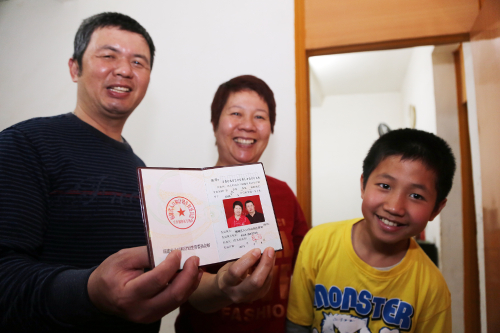|
 |
|
BIRTH PERMIT: Fu Quanmin, a resident in Quanzhou, Fujian Province, receives a permit allowing him and his wife to have a second child, on April 9, 2014 (ZHANG JIUQIANG) |
Zhong estimated that the couples submitting application according to the new policy accounted for approximately 6.7 percent of total eligible couples in the city.
He said the number of applications was lower than the expected 54,200 annually. However, he said that it is likely to take three to five years to see the effect of the policy, because some eligible couples not submitting applications may choose to do so later.
Some couples in their 20s and early 30s, the demographic group mostly likely to be eligible, have just had their first child or have no children.
An eligible Beijinger born in 1980 said that right now, he is preoccupied with taking care of his first child, who just turned 1 year old. Having a second child is not yet on his or his wife's agenda.
Besides, in places such as Beijing, Tianjin and Chongqing municipalities and Sichuan Province, after the birth of their first baby, a couple is required to wait for three to four years to have the second one, unless the mother is above a certain age limit, usually 28 years old.
In Shanghai, the situation is similar. Currently, 90 percent of women in child-bearing age are eligible to have a second baby, yet less than 5 percent of eligible couples submitted applications in 2014, said Pan Hua, an official with Shanghai Municipal Commission of Health and Family Planning.
Why not two?
In November 2014, China Youth Daily surveyed 2,052 residents across the nation, asking eligible respondents the reasons for not submitting an application.
Respondents reported that the top reasons for not having another baby are "the economic cost of child-rearing is too high," "the time cost of child-rearing is too high," "one child is enough," and "I need more time to think about it."
Another survey conducted in Shanghai showed that the annual cost of child-rearing is more than 30,000 yuan ($4,839). It was estimated that, from birth to university graduation, a child costs more than 1 million yuan ($163,399).
A man surnamed Chen and his wife Li, both born in the 1980s, told Ningbo Evening News that they cannot afford to have another child. Chen was an only child, so now they can have a second baby, but Li thinks that having a second child will lower their living standard.
Li said that, although they are a working couple, they would like to save money to give their son a good life and education. She planned to bring her son to tour some Southeast Asian countries this year, then put aside money to send him to receive an education overseas in the future.
For some couples that can afford the economic cost, the time cost is high enough to put many off. Yu, a 34-year-old man in Ningbo of Zhejiang Province and his 33-year-old wife Shi are one such couple. Yu is a businessman with a decent income. They had their daughter in 2006.
Shi once wanted to have a second baby, but after her daughter went to primary school, she changed her mind. Her daughter was enrolled in four after-school classes, including calligraphy, dancing, music and the game of go. Shi had to accompany her to all these classes. She said that she would like to focus her mind on bringing up her daughter well, and has no energy to take care of a second baby.
Some women are reluctant to have a second baby because they think that would affect their career development, Pan said. She said that in Shanghai, women on average give birth to their first baby around the age of 28, and they do not like to give birth to a second baby at a time so critical to their professional growth.
| 